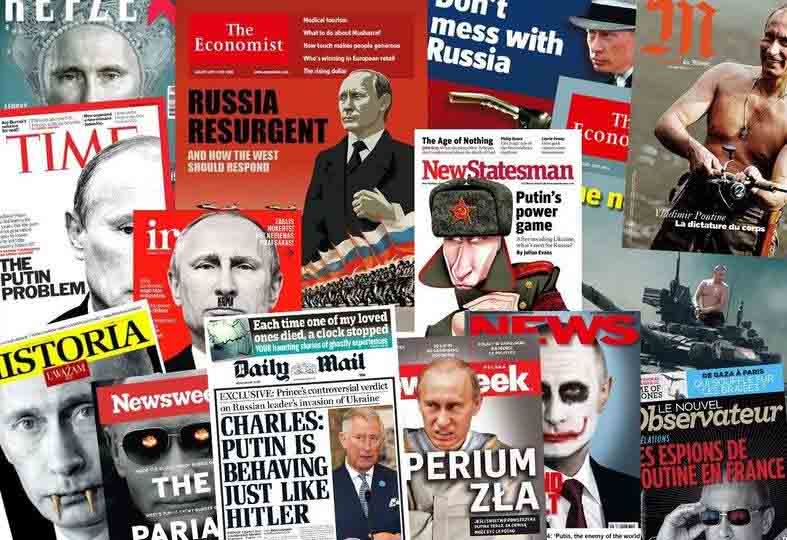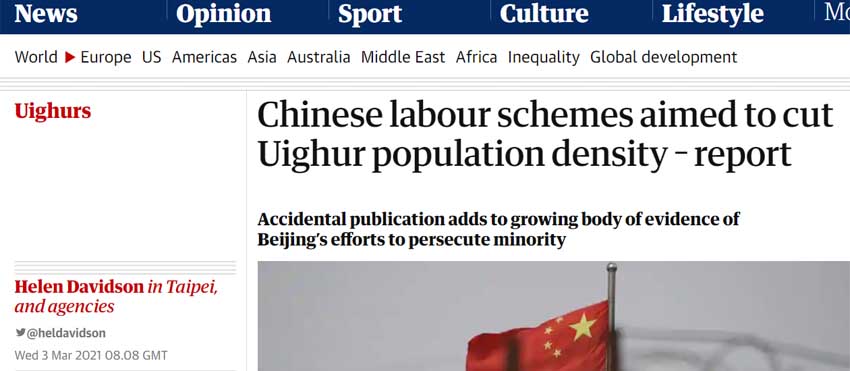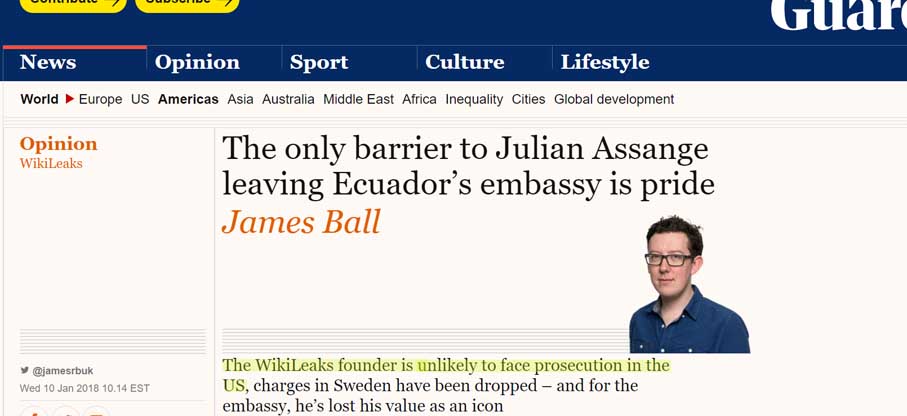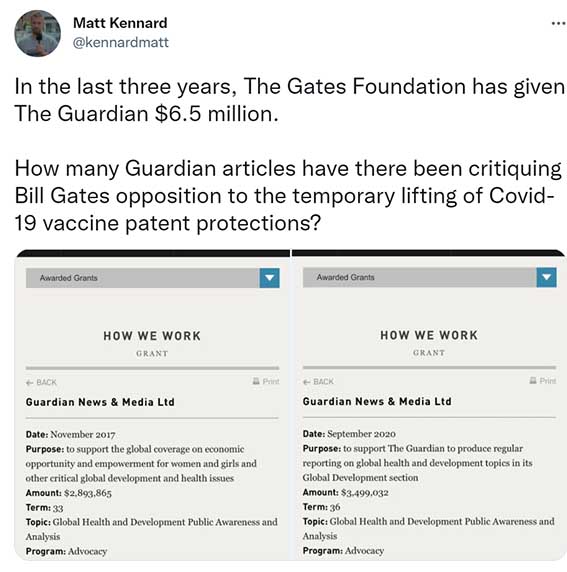
Guardian July 16, 2020. Phrases like “UK says …” (“experts say” .. “intelligence sources believe” …) do play, when they fit with narratives years in the making, on our unconscious conflation of “we have evidence” – claimed by sources we trust in spite of atrocious form – with actual evidence.
*
A friend of a friend, responding to criticisms of the Guardian, wrote:
What is going on here as far as the much-lambasted Guardian is concerned? Is there some kind of conspiracy? How does that work? Or is it sloppiness or laziness on the part of The Guardian and its contributors? Or some kind of malice? Or just crap judgment?
Is there monolithic control at the top of the Guardian, wilfully distorting and slandering due to some shared agenda? And requiring adherence throughout the organisation?
*
These are good questions which merit an answer. I’ll keep it brief.
For the most part we need assume no conspiracy. A 200 year business model of media reliance on advertising – indirect in the case of the BBC 1 – has established an Overton Window through which an extreme world order is normalised, and those whose analyses fall outside it depicted (actively, or by resounding silence) as the true extremists. I explored this just days after Labour’s hammering in local elections last May. See Britain decides!
By “an extreme world order” I mean that:
- Our world is capitalist in its advanced stage of imperialism – the export of monopoly capital from global north to south, and the south to north repatriation of profits.
- The clearest beneficiaries of this world order are rentier elites in the most successful imperialisms: i.e. most of the former colonial powers (USA included) but also the Antipodes, Canada, Scandinavia and an EU led by Germany.
- In its initial progressive phase capitalism freed humanity, albeit at terrible cost, from feudal ties and slavery while hugely advancing human productivity. Now its structures (means of wealth creation in ever fewer hands) and laws of motion (prioritising above all else of private profits and insatiable accumulation) demand unsustainable levels of narrowly defined and distorted ‘growth’, condemning the world to: (a) environmental degradation; (b) ceaseless wars, normalised, monetised and sold to us in tissues of lies; (c) levels of global inequality as dysfunctional as they are obscene, and radically incompatible with meaningful democracy.
Collusion by corporate media in maintaining the above seems on the face of it to be refuted by pluralism of view and vigorous debate on matters, not all of them trivial, which present no real threat to rule by and for the few.
(We can define a ruling class by monopoly ownership of some essential of wealth creation. All the rest flows from that. Under capitalism this essential is capital, finance capital in particular, although land ownership – the defining feature of a feudal ruling class – remains important. 2 )
But on matters pivotal to class rule there is little substantive difference between Guardian and Mail, Mirror and Economist. Examples? Across the board vilification of Assange, Corbyn, Assad, Putin and Xi. All in their different ways did or do obstruct or threaten the world order as set out above. None more so than those last two: bêtes noires and metonyms for the rise of Eurasia to call time on five centuries of Western hegemony.


“Evidence” for this headline – and “Xinjiang genocide” – comes from Adrian Zenz, Christian fundamentalist author of a risible “study” from which even the US State Department distanced itself (though former Sunday School teacher Mike Pompeo, who bragged about CIA lying, did not). Zenz says God has tasked him with ending communism.
The Guardian’s case is special in more ways than one.
- It is trusted by a liberal intelligentsia which may hold little direct power but punches above its weight in opinion-setting among the wider public. That intelligentsia would never have bought the vilification of Julian from Mail, Telegraph or Sun, but lapped up the same and worse in the Guardian. Ditto with Jezza and even Russell Brand. “If the Guardian – including George and Owen 3 – says they’re bad, well, it must be right …”

Given Ball’s staggering smugness it seems nit-picking – I wouldn’t bother if his error had not been so widely shared – to point out that “charges in Sweden” could not be “dropped” since no charges were ever made.
- A double whammy of having no pay-wall (essential to its status as the world’s leading liberal paper) and ad revenues in free fall leaves the Guardian increasingly dependent on donations, especially in the USA and from the super rich. Need I say more?

- Market forces suffice in the main to explain why all corporate media depict – more by lies of omission than commission – our extreme world as problematic, yes, but the best one available. That said, conspiracy is indeed needed at times. Since its plaudit garnering publication of the Snowden Files, there’s been no shortage of evidence of Guardian collusion, including having chief editors sit on the D-Notice Committee, with British military intelligence. This is touched on in Britain decides! – and covered more fully in other sources, this for instance.
As to the question – is there some monolithic control at the top of the Guardian? – here too we need assume no such thing. Why do we so often fail to generalise – a variant on the Gell-Mann Amnesia Effect – the lessons of our own experience of the corporate world?
Journalists who know what’s good for them please editors. 4 Editors who know what’s good for them please proprietors. Proprietors – whether Guardian Media Group or the Citizen Kane king-makers of Murdoch, Rothermere and Barclay Bros stripe – not only crave honours and a seat at the high table but, more systemically, are subject to the market discipline of advertising: and in GMG’s case the neo-feudal beneficence of wealthy patrons who need do nothing so vulgar as spell out their expectations. That they can at any moment withdraw their love and turn off the money flows is corruption enough.
This covers it, I think.
* * *
- In Britain decides! I wrote that “the Beeb relies on licence fees set by politicians who themselves fear the editorial fulminations of the Mail, and/or are in bed with Murdoch et al .. [moreover] its upper echelons are disproportionately Eton/Oxbridge.”
- Bill Gates has spent a decade acquiring hundreds of thousands of acres of arable land and pasture.
- As the Guardian confers liberal respectability on a rotten status quo, so do writers like George Monbiot (excellent on linking ecocide to big money, dire on Syria) and Owen Jones (author of such worthy tomes as The Establishment, useless when his employer was trashing Corbyn) give left cover to the Guardian. No one has explored this better than former Guardian columnist Jonathan Cook, cited freely in What’s the point of George Monbiot?
- My observations on journalists and their editors knowing what’s good for them don’t necessarily or even usually imply cold calculation. The subject of ideology, touched on in the third of my February reads last year, is vast. Here it suffices that in our messy world: (a) humans are good at believing what it suits us to believe; (b) we’ve imbibed since infancy – from news media (which journalists consume as well as produce), from school and college, and from arts and entertainment whose soft propaganda power is underrated – that liberal democracy is the worst system except for all the others; ergo (c) most journalists will believe the dangerous drivel they so often write.
As Chomsky famously told Andrew Marr, then at the BBC, we needn’t assume self-censorship. The relevant section of that 1996 exchange can be watched here. At just over three minutes it’s worth seeing the clip in its entirety but the part I refer to starts at 2:56 with Marr asking his guest, “how can you know that I am self censoring?”
But if news reporters, feature writers and opinion columnists were to wake tomorrow knowing what I know, they’d soon find themselves experiencing cognitive dissonance at levels that might see them seeking another line of work.

After years of being given a free ride on serial behaviour which would have resulted in a sustained media pile on if it had been anyone else it is interesting to see the reaction of those whose lives evolve around tribalism to the current media critiques of the present occupant of Number 10 Downing Street.
The kind and level of vitriol spewed out against Johnson is nowhere near the level of that employed against others in recent times. From Corbyn to Assange, Putin to Trump, Mugabe to Xi. And nowhere approaching as sustained over a far longer period of time.
Whats sauce for the goose etc. Question is, will the faithful join the dots?
But that’s just what we see on the surface. Point being the same process of vilification – what is today referred to as ‘Cancel Culture’ (something I wrote about back in July entitled ‘Wheeshting for Thatcherism’) – continues apace at lower levels. The Mail (and at least, unlike the Guardian, it can with a straight face at least honestly claim to do what it says on the tin and does not pretend to be something it isn’t) ran this piece yesterday:
https://www.dailymail.co.uk/news/article-10429031/Jewish-academics-sudden-death-Twitter-pile-investigated-coroner.html
Which generated the observation that whilst Corbyn, as well as Labour Party Members many from the ‘wrong’ kind of Jewish Community’ who still continue to be smeared and bullied in public, have had to put up with far worse over a longer period of time.
Yet as far as this story is concerned the sub text is that even though it was not Corbyn or the ‘wrong kind of Jew’ who manipulated the photograph for obvious sectarian political ends the tragic outcome was still their fault because they pushed back against what is becoming almost a ‘sacred’ Establishment narrative.
In similar vein the official narrative headline today of ‘Russia/Putin planning a coup/invasion” is almost as consistent over a long period of time as the headlines in the Scottish publication the National about an imminent Independence Referendum. A random search engine exercise using the key terms can find the same headlines running back at least seven or eight years or more on both subjects.
Yet its as rare as rocking horse droppings to find anyone asking the very obvious question of ‘WTF are the Russians/Putin waiting for’ in refusing to validate these consistently bogus, evidence free rantings (you can’t call them stories) by sitting on their backsides doing bugger all?
Even Jackanory didn’t do as much boy who cried wolf posturing as we are subject to at present.
I am mostly in agreement with this analysis. I imagine that the proprietors meet together in smoke filled rooms along with people from the intelligence agencys and others, not necessarily to recieve their orders but to reach a consensus how everyone is going to report something and what lines to take. Such conspiracy might take various forms, formal and informal, long or short term but perhaps evolving to the form which most efficiently serves their class interests. As this guy says:
https://shadowrunners.substack.com/p/conspiracy-theories-and-social-control?s=r
We don’t have to assume conspiracy but that doesn’t mean it isn’t there. The question is how likely is it to be there. Where there is means motive and opportunity to conspire that is a clue to how likely it is to be present, depending on just how much means motive and opportunity is present. If the presence of conspiracy is impossible to prove or disprove is that a clue as to how likely it is to be present?
In general, if government is run by gangsters then it is run by organised crime like the mafia, which means competing but defined groups which move between co-operation an feuding but which are all driven by the class interests of the people involved.
Good points, all. Agreed.